
Dalai Lama talks religion, not politics
4/20/2008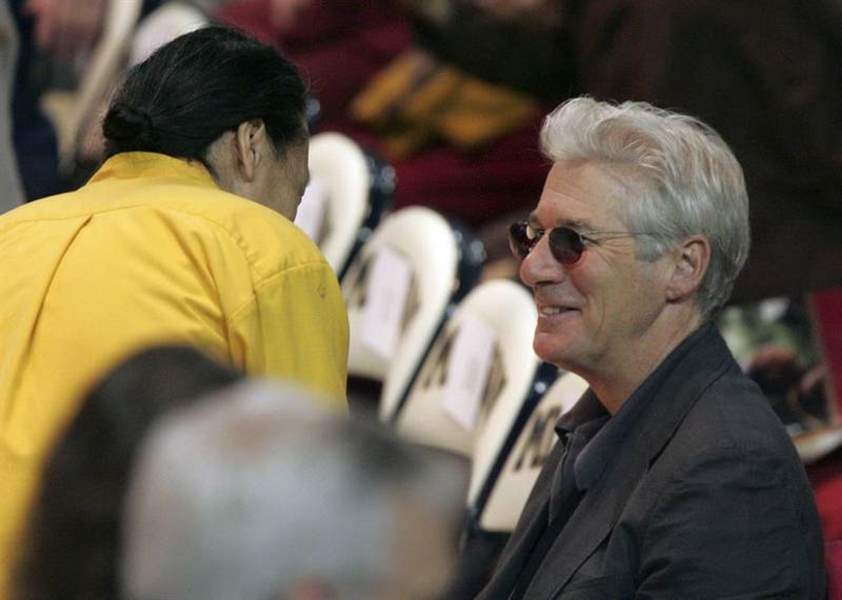
Actor Richard Gere attended and paid close attention to His Holiness the Dalai Lama's first session in Crisler Arena.
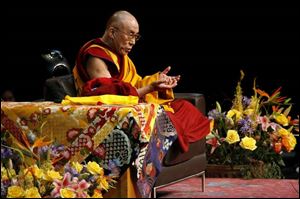
Wearing his traditional robe and sitting cross-legged, His Holiness the Dalai Lama talks to a sold-out crowd at Crisler Arena.
ANN ARBOR - Alternately charming and jovial, or professorial and intense, His Holiness the Dalai Lama lectured for more than four hours yesterday on Buddhist teachings to a sold-out crowd of 8,300 at Crisler Arena.
The 72-year-old exiled religious and political leader of Tibet divided his lectures into two-hour sessions, one in the morning and one in the afternoon, each of which went longer than scheduled.
The man revered by Tibetan Buddhists as the reincarnation of the 13 previous Dalai Lamas focused almost entirely on Buddhist religious views of wisdom, compassion, and the self.
He did not address the recent violence in Tibet or the controversy involving China's human rights record as it prepares to host the Olympic Games in August.
Wearing his familiar maroon and mustard-colored robe, the Dalai Lama entered the basketball arena through large red curtains at the back of the stage as the hall was silent - no applause, no music. He greeted most of 25 or so monks on the platform individually and when he sat cross-legged on a brown leather chair, audience members also took their seats.

Actor Richard Gere attended and paid close attention to His Holiness the Dalai Lama's first session in Crisler Arena.
The stage was decorated with maroon and gold carpets, bright flower arrangements, a table laden with fruit and loaves of bread, banners of the Buddha, and an ornate, 15-foot tall multicolored sculpture made of butter.
Security was supervised by the U.S. State Department, which screened all entrants, banned cell phones, and kept a close eye on proceedings.
The first lecture began with a cheery, informal chat from His Holiness, who gave a humorous reason for his being here: "Why giving lecture in large audience, to essentially non-Buddhists, in non-Buddhist country? Why? I have to find answer for that question."
He chuckled and the crowd chimed in with laughter.
The reason, he said, is that interfaith dialogue and information about other religions can promote peace. Teaching Americans about Buddhism can create a connection "mentally, emotionally," he said.
"The effort to promote human harmony on the basis of mutual respect among other traditions is very, very beneficial," he said. "So therefore it is helpful to know what is Buddhism, what is Buddhist approach?"
He gently rebuked "the sometimes fundamentalist attitudes" of people who feel endangered or threatened when meeting people of different traditions.
"Now my case, learn more about Islam, about Christianity, about Judaism, mainly through personal contact," he said. "My attitude, my genuine admiration, respect, and appreciation to these traditions grow."
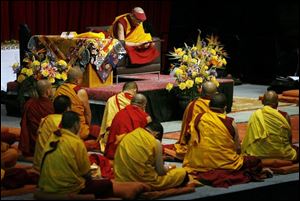
About 25 monks sat on the stage with the Dalai Lama.
He spoke of diversity not only between different faith traditions but also within Buddhism and joked that Buddha may have deliberately taught different lessons to different disciples just for the fun of it.
"Maybe he deliberately tried to create more confusion among his followers' minds. Or maybe he was pleased to see debate among his followers," the Dalai Lama said with a chuckle. "I don't think that's the case."
More likely, he said, Buddha realized that certain teachings are more suitable for some people than others.
In the same way, the Dalai Lama said, specific religions may be more suitable for some people than for others.
"We cannot say among these different traditions that this is 'best.' We cannot say that. We have to judge according to individual case."
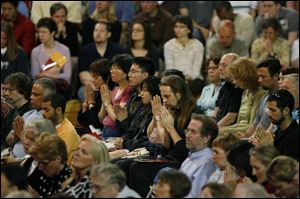
His Holiness entered to no applause from the crowd, for whom security was strict at the two sessions.
He told a story that warned against individuals mixing and matching parts of religious traditions.
A Christian missionary who came upon hard times was helped by Buddhist monks, he said. "She told me now for this life she is Christian. But for next life, she is Buddhist," he said, then laughed heartily.
"Not true Buddhist. Not true Christian. That is truly sign of confusion, isn't it? So it is much better keep one tradition. Much safer," he said.
The Dalai Lama said there is a movement among today's Buddhists to get back to the original teachings of Buddha and away from some traditions and rituals the religion has accumulated over the centuries.
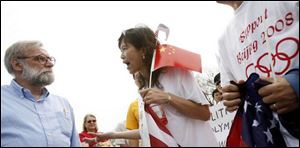
A man argues with Rica Li, a China native and now of Canton, Mich., after the session.
"Sometimes I really feel we follow Buddha sometimes in neglect of his real teachings and weave too much importance, emphasis on ritual. So now we must go to the original teaching. That is important," he said.
Actor Richard Gere, wearing a sport coat and jeans, sat in the front row with a pad and pen, listening attentively throughout the day's sessions and occasionally jotting down notes.
The Dalai Lama, slipping a maroon sun visor onto his shaved head, spent an hour and 20 minutes in his first lecture delivering a scholarly treatise on Buddhist teachings on overcoming suffering. With video close-ups of His Holiness shown on the arena's scoreboard, the Dalai Lama spoke in Tibetan for 2 to 10 minutes at a time, followed by an aide who spent an equal amount of time - or more - translating into English.
"Of course, my knowledge is very, very limited. My experience even more limited," the Dalai Lama said humbly.
Unlike his friendly and affable conversation, the lectures were dry, intellectual explorations on overcoming suffering through enlightenment.
"Recognize that in the final analysis, at the root of all our suffering lies a form of ignorance, a form of unknowing. Not only a diluted state of mind, but a distorted state of mind," the Dalai Lama said.
In the second session, His Holiness again entered the arena in silence and, skipping the small talk, dived right into his lecture, speaking in Tibetan.
The temperature in the arena rose uncomfortably in the afternoon and midway through the talk scores of empty seats dotted the upper section of the building.
The afternoon lecture dealt with knowledge of self, from theories of life origin to understanding how a person consists of mental and physical aggregates.
Outside Crisler Arena, about a dozen Chinese students held a peaceful demonstration with displays supporting the Olympics Games. They handed out pamphlets calling for truth in news coverage of the Tibet controversy.
"The media distort the truth. We are the voice on the other side," said Liang Zhang, a 26-year-old engineering student at the University of Michigan. "We are here to support the Olympics and to speak out against violent behavior."
One passer-by shouted at the Chinese students: "Isn't it nice to be in a free country where you can protest without being shot?"
Rimpoche Arjia of the Tibetan Mongolian Buddhist Cultural Center in Bloomington, Ind., called the ongoing controversy over the Olympics and recent riots in Tibet "very sad."
"I hope there is a solution. Violent protest doesn't work. Chinese government's crackdown doesn't work. Harmonious dialogue is the true solution," he said.
His Holiness the Dalai Lama will speak at Crisler Arena at 10 a.m. today on "Engaging Wisdom and Compassion," and at 2 p.m. on "Sustainability." Both lectures are sold out.
Contact David Yonke at:
dyonke@theblade.com
or 419-724-6154.